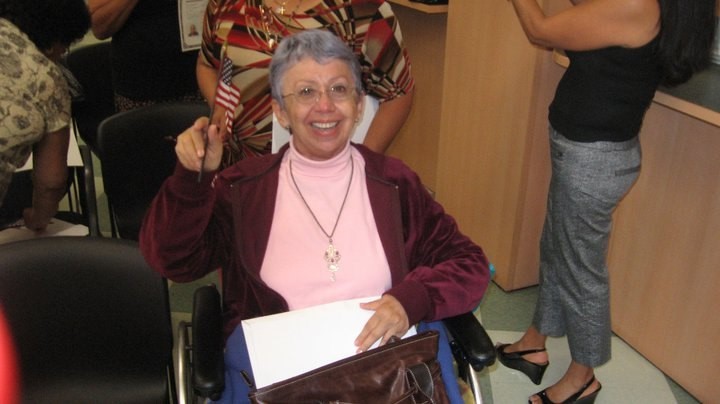Welcome in the Workplace: CLINIC Staff Share Stories of Naturalization

CLINIC is proud to have several members of its staff who are naturalized citizens or the children of naturalized citizens. They bring to CLINIC a valuable diversity of experience, perspective and culture that helps shape our work and mission.
Naturalization is the process by which foreign-born legal U.S. residents become U.S. citizens, conferring on them the same rights and duties as citizens born in the U.S. Eligible lawful permanent residents must go through a multi-step process which includes an English language and civics exam and an oath of allegiance to the United States. Naturalization represents participation in the full civic life in the United States, including through voting and ability to sponsor relatives to immigrate as well.
Several CLINIC staff members agreed to share their stories of naturalization in honor of Citizenship Week. We are honored to share them here.
Fleeing to the U.S.
One CLINIC employee, who asked to remain anonymous, shared that she naturalized with her parents when she was a child, eight years after her family had fled to the United States from Nicaragua in the 1980’s due to political persecution during the civil war.
Her father had been an attorney in Nicaragua and had had a few high-profile cases that turned the government against him. He and his family had to flee for safety. While her father was able to get a visa to come to the U.S., the CLINIC employee and her mother had to come to the border as asylum seekers. “We crossed the river in the middle of the night,” she explained. She was then just four years old.
Her parents worked hard to support the family and to integrate into the United States, taking English classes in their spare time. They got work permits and eventually were eligible for citizenship.
“I was only 12 when my parents were naturalized,” she recounts. “I remember my parents studying [for the citizenship exam] and trying to memorize the names of our senators, congressmen, previous president’s names, etc. It was so hard for them to study everything, yet my parents had no idea what [the officials] would actually ask them in the interview.”
She recalled the day of the naturalization ceremony: “I remember being at the courthouse in Baltimore with my parents that day. There were a lot of people who were being sworn in that day, with their families there watching and supporting them. It was amazing to hear them recite the pledge all together.”
Receiving and giving back
Another CLINIC employee, who also asked to remain anonymous, recounted that while the process of naturalization was fairly challenging and stressful, he would “strongly encourage it” for others considering becoming naturalized. He encouraged those who have been naturalized to “teach others what you have learned in your naturalization process so that hopefully it is easier for them. Encourage friends, family, and your community to vote and to voice their concerns at every level of government.”
This employee noted that one way he is glad to give back to his community is through Spanish-English interpretation for those going through the citizenship process. “I started helping interpret as a young kid and I think helping other immigrants in small and big ways will be a life journey for me,” he said. He noted that such commitment to helping other immigrants is part of what led him to work at CLINIC.
A life-changing experience
State and Local Advocacy Attorney Viviana Westbrook interviewed her mother, Susana, about her naturalization experience. Susana, who is from Mexico, decided to become a citizen after many years of living in the U.S. with her late husband, James, who was a citizen. James encouraged Susana to apply and helped her with the preparation, as she was very nervous. Susana had never completed past an eighth-grade education, and she feared she wasn’t up to the challenge, but James insisted she was. “He was my constant cheerleader,” Susana said.
Susana recalled the day of the citizenship exam. It was “a beautiful, sunny day. When I was taking part of my exam, I saw JFK’s famous quote about ‘ask not what your country can do for you, ask what you can do for your country.’ It is one of my favorite quotes. It spoke to me and my desire to participate in elections. When I saw it on the exam, I felt it was a good sign.”
Susana remembers the day of naturalization fondly. “I hadn’t thought I would be emotional [when taking the oath of allegiance] but my skin became covered in goosebumps, my throat was a knot — I could barely get the words out. I kept crying tears of joy. It all meant so much to me. It was one of the biggest accomplishments of my life.”
Susana looks back with great relief at her decision to naturalize, because it has paid off enormously. Although she says the process was challenging, she explains that after James’ death, she was only able to collect his social security to support herself because she was a citizen; she would have been ineligible as merely a green-card holder. As she has a disability and is in a wheelchair, this support is critical. “You never know the impact becoming a U.S. citizen will have on your life. If you are eligible, you should go for it,” she says.
She also says she has relished being able to cast her vote in elections as a citizen. She takes great pride in feeling like her voice and opinions are heard.
Reflecting on her mother’s experience, Westbrook says after she naturalized, her mother “felt like she could now make a difference [effecting change in our country]. I loved seeing that fire in her…In the years since, I have gotten to see many clients experience that liberation, excitement, and pride of becoming a citizen. It is something I wish for all those who call this country home.”

